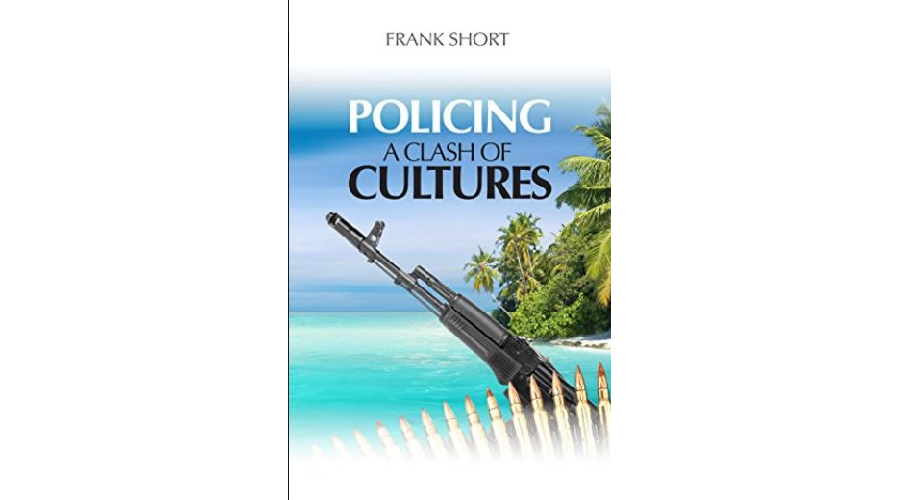Many correspondents who read my daily posts on Linkedin and letters I write that are published by the Solomon Islands newspapers, as well as being published as blog posts on my website -www.solomonislandsinfocus.com - a website I introduced in 2014 to assist with news about the Solomon Islands, help promote and find buyers for locally made crafts, aid charity causes, especially the needs of the medical services, assist with exports, help for the disabled, women's issues, especially domestic violence and gender concerns, along with many other issues of interest and concern in the Solomons, have contacted me about the book I wrote and published after I left my post as the local police commissioner in 1999.
I assume the new interest in my book has arisen following the news that the government in the Solomon Islands this week procured some 60 military type carbines from Australia for use by RSIPF personnel to be deployed on public order disturbance duties. The decision has brought about an outcry from the Leader of the Opposition and from many writing to the media and posting adverse comments on Linkdedin, including a reaction from myself having witnessed the intimidation, destruction, damage and deaths caused by lethal firearms in the hands of "militants" bent on destroying the make-up and fabric of the hitherto peaceful Solomon Islands from late 1998 to 2003. A situation one has come to know as the 'Tensions' and from which time the country and its people have never truly recovered.
The book I titled 'Policing a Clash of Cultures' is rated highly on Amazon Kindle's website and tells the true story of happenings and events in the Solomon Islands from1997 till my departure in mid July 1999, and covers the happenings from December 1998 which saw the once Happy Isles' effectively slip into civil conflict that brought the beautiful country to its knees, and some labelled the sovereign state - a failed one.
The book was described by a foreign diplomat that had seen service in the Solomon Islands in the following words, and there were other commentators with similar views.
...........................
Quote.
"Policing a Clash of Cultures,’ is written by the former Commissioner of Police in the Solomon Islands, Frank Short, who tells the tragic story.
This man was there – before, during; – handling confidential and often politically dangerous information on a daily basis. His inside knowledge comes from being the man in the centre of the developing storm.
"His hands on knowledge of how the debacle that became known as the period of ‘ethnic tension’ in the Pacific nation first began; how intelligence which he accurately assessed and presented to regional governments was ignored; allegedly leading to a failed state; the deaths of many civilians; the displacement of thousands.
"Until now, explanations of what really happened have relied too much on analyses of the local and often distorted foreign media reports – methods singularly inappropriate in largely illiterate societies.
"Frank Short was a popular and successful Police Commissioner with extensive, prior, colonial policing experience. Experience which helped him understand, appreciate, local customs and sensitivities.
"The book records well, how disparate tribal dissatisfactions’ came together so disastrously and how the civil conflict could have been prevented if regional governments had had the will and the belief in a right to protect a neighbouring state.
"Frank Short claims that by Australia and New Zealand remaining as passive witnesses, allowing what started as a low intensity civil conflict fermented by a few insurgents; urged on by the then Solomon's Parliamentary Opposition, the situation turned into a full blown humanitarian crisis: which led to the downfall of the democratically elected government and the resignation of the then Prime Minister -- at gunpoint.
"The internal security situation in the Solomon’s became a security concern for Australia only when the Prime Minister, John Howard, stated:
“Failed States present a dangerous breeding ground for crime and terrorism.”
"In 2003, nearly five years after the internal conflict first began the Regional Assistance Mission (RAMSI) consisting of several Pacific Island states, arrived in the Solomons, led by Australia, with New Zealand support, a huge transfer of military assets, including over 2000 military personnel, police and equipment in the first phase of the intervention operation. Faced with such overwhelming force, the warring tribal factions were quickly dealt with, thousands of lethal arms confiscated and destroyed; key militants arrested and brought to justice. However RAMSI still remains in the Solomons some eleven years later.
"Short’s book makes the case that there was a precedent in International law for a much earlier intervention and he dismisses the claim that the Solomon Islands posed a threat to Australia from the risk of terrorism off its shores.
"In a report recently published in June 2014 in Australia by the Lowly Institute, an Independent, nonpartisan policy think tank located in Sydney and rated as Australia’s leading think tank providing high-quality research and perspectives on international trends shaping Australia and the world, the same claim over the potential for terrorism is debunked but, more interesting and concerning, particularly to the Australian taxpayer is the fact that the same report has described support for RAMSI since 2003 as A2.4 billion and a massive sum disproportionate to Australia and that, from the start, the Mission had no clearly defined exit strategy.
"The cost of providing Australian Federal Police (AFP) assistance through the auspices of RAMSI in the same period is said to have cost A$1.5 billion, but when Short turned to the AFP for help for the Royal Solomon Islands Police Force at the onset of his appointment as the Commissioner of Police, he was effectively shown the door, unlike help he received from the Singapore Police with training in community policing."
End of quote.
Yours sincerely
Frank Short



